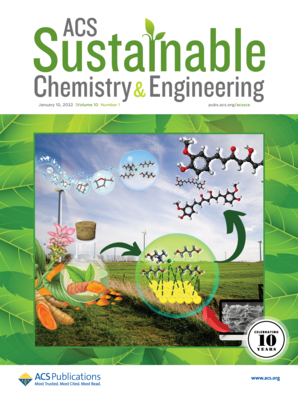Mechanoenzymatic Depolymerization of Polyethylene Terephthalate in Moist Solids: Exploring the Roller Mill
IF 7.1
1区 化学
Q1 CHEMISTRY, MULTIDISCIPLINARY
引用次数: 0
Abstract
Plastic pollution has emerged as a critical global environmental challenge. Effective end-of-life management of plastics remains a pressing issue. Recent advances in enzymatic technology offer promising solutions for the closed-loop recycling of many plastics. For example, numerous enzymes capable of depolymerizing poly(ethylene terephthalate) (PET) into its building blocks have been identified. Notably, enzymatic hydrolysis conducted in moist-solid reaction mixtures is garnering interest as a more sustainable alternative to traditional dilute aqueous conditions. When combined with intermittent mechanical mixing, this approach, termed mechanoenzymology, can enhance enzyme performance, while addressing solubility issues and avoiding the need for substrate pretreatment. Despite these advances, current research in mechanoenzymology predominantly relies on laboratory-scale experiments using shaker mills. This study aims to broaden the scope of mechanoenzymatic transformations by exploring the use of a roller mill instead. Roller mills find widespread use industrially (e.g., in the mining and concrete industries). Utilizing commercial cutinase Novozym 51032 (abbreviated HiC), we investigated how varying milling conditions, moisture levels, and enzyme loadings impact the efficiency and scalability of PET depolymerization to terephthalic acid. The results demonstrate the scalability of enzymatic reactions in moist solids from 300 mg to 3 g and to 30 g scales at a solids loading of 40% w/w and daily milling at 300 rpm for 30 min. This study lays the groundwork for advancing PET recycling technologies on a larger scale.

湿固体中聚对苯二甲酸乙二醇酯的机械酶解聚:辊磨机的探索
塑料污染已成为全球面临的重大环境挑战。有效的塑料报废管理仍然是一个紧迫的问题。酶技术的最新进展为许多塑料的闭环回收提供了有希望的解决方案。例如,已经确定了许多能够将聚对苯二甲酸乙酯(PET)解聚成其构建块的酶。值得注意的是,在湿固反应混合物中进行的酶水解作为一种比传统的稀水条件更可持续的替代方法正在引起人们的兴趣。当与间歇性机械混合相结合时,这种方法被称为机械酶学,可以提高酶的性能,同时解决溶解性问题,避免对底物预处理的需要。尽管取得了这些进展,但目前的机械酶学研究主要依赖于实验室规模的摇床实验。本研究旨在通过探索使用辊磨机来扩大机械酶转化的范围。辊磨机在工业上有广泛的应用(例如,在采矿和混凝土工业中)。利用商用角质酶Novozym 51032(简称HiC),我们研究了不同的研磨条件、湿度水平和酶负荷如何影响PET解聚到对苯二甲酸的效率和可扩展性。结果表明,在固体负载为40% w/w,每天以300转/分研磨30分钟的情况下,酶促反应在300毫克至3g和30克的湿固体中具有可扩展性。该研究为更大规模地推进PET回收技术奠定了基础。
本文章由计算机程序翻译,如有差异,请以英文原文为准。
求助全文
约1分钟内获得全文
求助全文
来源期刊

ACS Sustainable Chemistry & Engineering
CHEMISTRY, MULTIDISCIPLINARY-ENGINEERING, CHEMICAL
CiteScore
13.80
自引率
4.80%
发文量
1470
审稿时长
1.7 months
期刊介绍:
ACS Sustainable Chemistry & Engineering is a prestigious weekly peer-reviewed scientific journal published by the American Chemical Society. Dedicated to advancing the principles of green chemistry and green engineering, it covers a wide array of research topics including green chemistry, green engineering, biomass, alternative energy, and life cycle assessment.
The journal welcomes submissions in various formats, including Letters, Articles, Features, and Perspectives (Reviews), that address the challenges of sustainability in the chemical enterprise and contribute to the advancement of sustainable practices. Join us in shaping the future of sustainable chemistry and engineering.
 求助内容:
求助内容: 应助结果提醒方式:
应助结果提醒方式:


